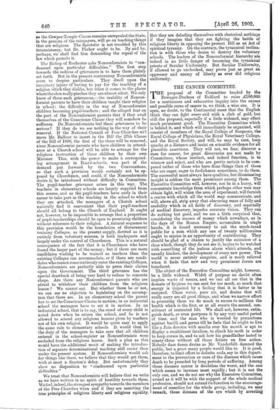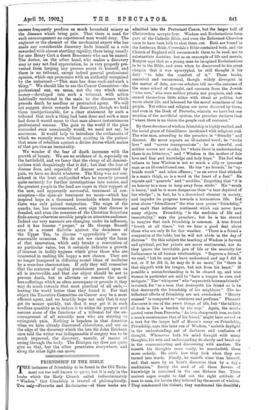THE CANCER COMMITTEE.
T"proposal of the Committee headed by the Dowager-Duchess of Bedford to raise .2100,000 for a continuous and exhaustive inquiry into the causes and possible cures of cancer is, we think, a wise one. It is open, no doubt, to the Continental sneer that the English think they can fight every evil with a club of gold, but still the proposal, especially if a little widened, may effect much permanent good. The Executive Committee which is behind it, and which will immediately be organised, will consist of members of the Royal College of Surgeons, the Royal College of Physicians, the Royal Veterinary College, and the Royal Society, and will, we may be sure, keep quacks at a distance and insist on scientific evidence for all plausible assertions. They will not, we fear, discover a cure for cancer, for great discoveries are not made by Committees, whose instinct, and indeed function, is to winnow and reject, and who are pretty certain to be com- posed rather of those who have done things than of those who are eager, eager to foolishness sometimes, to do them. The successful must always have qualities, but illuminating insight is seldom the most prominent among them. The Executive Committee will, however, not be in a hurry, will concentrate knowledge from which perhaps other men may obtain light, will widen the area of experiment, will furnish a centre with which all the world may communicate, and will, above all, strip away that obscuring mass of folly and credulity which in all fields of discovery, and especially of medical discovery, impedes accurate vision. They can do nothing but good, and we are a little surprised that, considering the masses of money which nowadays, as in the days of the Roman Empire, accumulate in single hands, it is found necessary to ask the much-taxed public for a sum which any one of twenty millionaires ought to rejoice in an opportunity of contributing. They should be glad of a chance to justify the existence of a class which, though they do not see it, begins to be watched with something of the jealous alarm which attends, and usually hinders, the development of every new power. The world is never entirely sanguine, and is much relieved when it finds that new and very prominent forces are beneficent.
The object of the Executive Committee might, however, be a little widened. Width of purpose no doubt often implies waste of means, and we can all see that in the domain of hygiene we can seek for too much, so much that energy is impaired by a feeling that it is better to be resigned. Clean water, pure air, and drains that will really carry are all good things, and when we narrow effort to procuring them we do much to secure to millions the health which is the first, or at all events the second, con- stituent of contented life. We shall not, however, extin- guish death, or even postpone it by any very useful period of time, and the man who is worried by precautions against bacilli and germs till he feels that he ought to live like a Jain devotee with muslin over his mouth is apt to display a recalcitrant fatalism, to clinch his teeth in order to keep curses in, and to ask how his grandfather lasted to ninety-three without all those fetters on free action. Nobody dare damn drains as Mr. Vanderbilt damned the public; but a great many people would like to. It is good, therefore, to limit effort to definite ends, say in this depart- ment to the prevention or cure of the diseases which cause death to be preceded by long periods of suffering. Among those diseases cancer is doubtless the worst, and the one which seems to increase most rapidly ; but it is not the only one, and we do not see why the Executive Committee, armed as it will be with the support of the whole medical profession, should not extend its function to the encourage- ment of remedies for the whole group, including, we may remark, those diseases of the eye which by arresting careers frequently produce as much household misery as the diseases which bring pain. That there is need for such encouragement no experienced man would deny. The engineer or the chemist or the mechanical expert who has made any considerable discovery finds himself as a rule rewarded with almost startling rapidity, there being usually for one Henry Cort a dozen Bessemers who can be named. The doctor, on the other hand, who makes a discovery may or may not find appreciation, he is very properly pre- vented from keeping any process secret to himself, and there is no tribunal, except indeed general professional opinion, which can pronounce with an authority recognised by the unlearned—" This man has done such-and-such a thing." We should like to see the Cancer Committee—the professional one, we mean, not the one which raises money—developed into such a tribunal, with action habitually restricted in the main to the diseases which precede death by needless or protracted agony. We will not suggest direct rewards for discovery, though we hold them unobjectionable, for a clear statement by such a tribunal that such a thing had been done and such a man had done it would mean to that man almost instantaneous professional success. The gain to the world if the plan succeeded even occasionally would, we need not say, be enormous. It would help to introduce the euthanasia of which we recently wrote without exciting in the patient that sense of rebellion against a divine decree which makes of that practice an immorality.
We wonder if the fear of death increases with the growth of luxury. We see no evidence of it, especially on the battlefield, and we fancy that the clergy of all denomi- nations wish despairingly that it did ; but that the fear of disease does, and especially of disease accompanied by pain, we have no doubt whatever. The King was not con- sidered in the least undignified when he recently pressed quite earnestly for further investigations into cancer, and the greatest people in the land are eager in their support of the new, and apparently successful, treatment of con- sumption—the open-air treatment we mean—which has inspired hope in a thousand households where formerly there was only pained resignation. The reign of the quacks, too, has recommenced, sure sign that disease is dreaded, and even the nonsense of the Christian Scientists finds among otherwise sensible people an attentive audience. Indeed our very manners are changing under its influence, and it has become "proper," as Mr. George Russell says in a recent diatribe against the decadence of the Upper Ten, to discuss " appendicitis " on un- seasonable occasions. We do not see clearly the harm of that innovation, which only breaks a convention of no particular value, but it certainly indicates a growth of interest in bodily hygiene which gives those who are interested in making life happy a new chance. They are no longer hampered in diffusing sound ideas of medicine by a senseless obscurantism. If only they will remember that the sentence of capital punishment passed upon us all is irreversible, and that our object should be not to prevent death, but to alleviate or remove the need- less sufferings which so often accompany or precede it, they may do much towards that most practical of all ends,— leaving the world better than they found it. For that object the Executive Committee on Cancer may be a most efficient agent, and we heartily hope not only that it may get its money quickly, but that it may get it in such needless quantity as to induce it to widen its purpose and assume some of the functions of a tribunal for the en- couragement of all scientific men who are striving to extinguish . pain. Nothing is hopeless in that direction when we have already discovered chloroform, and are on the edge of the discovery which the late Sir John Erichsen once told the writer was indispensable if surgery was to be much improved, the discovery, namely, of means of seeing through the body. The Röntgen ray does not quite give us that, but the ether penetrates everywhere, and along the ether light can move.



























































 Previous page
Previous page